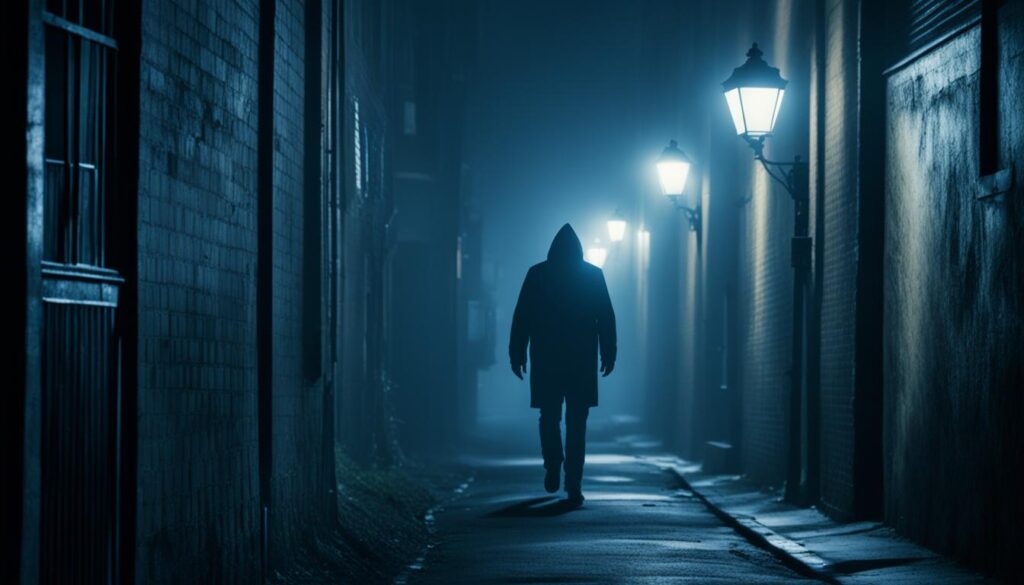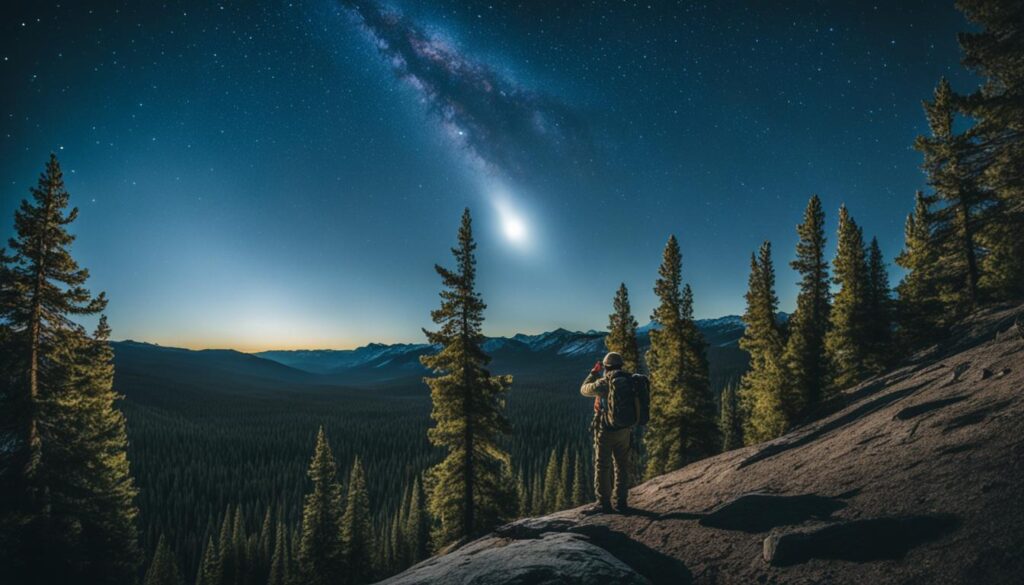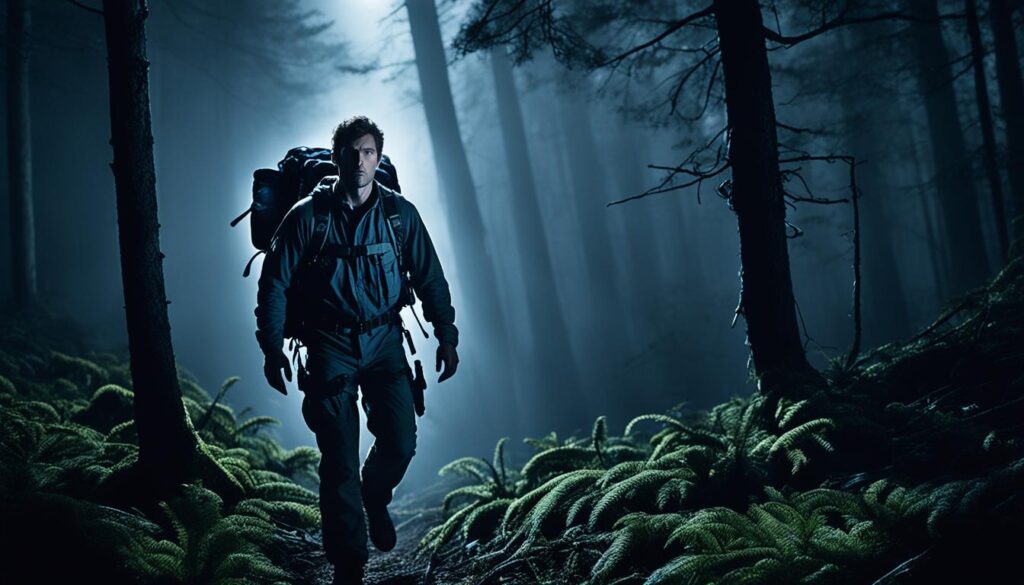Being a nighttime explorer means loving the peace and beauty of night. Yet, staying safe is vital. I focus on ensuring my safety whether in the wild or city. It’s all about staying on guard, ready for anything. With a few easy steps, I enjoy nighttime adventures, risky situations dialed down.
Key Takeaways
- Prioritize your safety and well-being during solo nighttime adventures
- Thoroughly prepare and plan your route to ensure a successful and secure exploration
- Heighten your senses to stay aware of your surroundings in the darkness
- Navigate nighttime environments safely by using lighting effectively
- Remain alert to potential hazards and know how to respond to wildlife encounters
Preparation is Key for Nighttime Adventures
Starting a solo journey in the night calls for detailed Preparation. Remember the old saying, “Failing to prepare is preparing to fail.” This is especially true after dark. Grab your Nighttime Gear and Plan Your Route carefully. Doing so ensures your nighttime trip is safe and fun.
Essential Gear for Solo Nighttime Exploration
Having the right tools is vital for night quests. You need a sturdy, top-notch flashlight for safe travels. Wear clothes that shine in the dark, staying visible is key. And always carry a charged phone. It’s your lifeline for maps, calls, and emergencies.
Planning Your Route and Notifying Others
Plotting your course ahead is crucial. Learn about the area and its challenges. Tell a friend or family member about your adventure details. This includes where you’re headed and when you plan to return. It’s a safety net in case things go wrong.
Focus on Preparation to enjoy your solo night trips. With the correct gear and a solid plan, relish the night’s peace and beauty. You’ll feel confident, knowing you’re ready for whatever comes your way.
“Preparation is not just about getting ready for the task at hand. It’s about being ready for any eventuality that may arise during your nighttime adventure.”
Heightening Your Senses for Nighttime Awareness
When you step into the night, it’s key to be more aware and sharp. This helps you move around with more safety and see dangers easily.
Your sight in the dark is vital. Your eyes need time to get used to the dark. Be patient and let them adjust. Using strong lights might blind you for a bit, making it harder to see in the dark.
Listening carefully is also essential. Hear the quiet sounds, like leaves moving or night animals. Paying attention can warn you of dangers or help you find where you are.
- Enhance your night vision by allowing your eyes to adjust to the darkness
- Tune in to the sounds of your surroundings to stay attuned to your environment
- Pay attention to your sense of touch and smell, as they can provide valuable clues about your surroundings
Don’t forget to use touch and smell too. They tell you a lot about what’s around, like the ground’s feel or nearby scents. Using all your senses helps you understand the night better and be more sure.
“The real voyage of discovery consists not in seeking new landscapes, but in having new eyes.” – Marcel Proust
Using your senses fully boosts your Nighttime Awareness. With time and effort, you can start seeing the night in exciting new ways. It makes your night adventures alone more fun and fulfilling.
Navigating Nighttime Environments Safely
Going out at night can be thrilling. But, staying safe is very important. Good lighting is crucial for your safety. It helps you see where you’re going in the dark.
Using Lighting Effectively for Visibility
Getting the right lighting balance is key at night. You must use your flashlight or headlamp wisely. Too much light can dazzle you or others, yet too little means a risk of not seeing clearly.
Follow these tips for the best use of lighting:
- Avoid shining your light directly into your eyes or the eyes of others. This can temporarily impair your vision and make it harder to navigate.
- Adjust the brightness of your light based on your surroundings. In open areas, you may need a brighter beam to adequately light your path, while in more enclosed spaces, a lower setting can prevent overwhelming your senses.
- Use your light strategically to scan your environment. Sweeping your beam across the ground, ahead of you, and to the sides can help you identify potential obstacles or hazards.
- Pair your primary light source with a secondary option, such as a small keychain flashlight or glow stick. This redundancy can be a lifesaver if your main light fails.
Be smart with your lighting to stay safe at night. Always plan and prepare well for your nighttime adventures.
Staying Alert to Potential Nighttime Hazards
Nighttime exploration has its own set of challenges, like tricky terrain and maybe bumping into some critters. It’s key to be wide awake when we head out after dark. This way, we not only enjoy the adventure but also keep ourselves safe.
Recognizing and Responding to Wildlife Encounters
Meeting wildlife is a big hazard out there at night. Many animals, like those that come out when it’s dark, might feel threatened by us. It’s a must to know the animals in your area and how they usually act.
When out in the dark, always be alert for animal signs. This could be the sound of bushes moving or eyes shining in the dark. If you see something, stay calm and drop the noise and sudden moves. Slowly walk away to give the animal lots of space.
If an animal acts aggressively, know what to do. Stay cool and try to look big with your arms up. Use a strong, steady voice. Move away slowly and watch the animal. Never turn your back. We aim to end any tense situation without making it worse.

Learning about local wildlife and how to act helps us handle surprise animal meetings safely. Being sharp and ready helps us enjoy exploring alone at night under the stars.
Nighttime Navigation Techniques
Exploring the outdoors at night needs special navigation know-how. Nighttime wandering is different from finding your way during the day. As someone who loves going out alone, I’ve found many ways to stay on track and find my way, even in complete dark.
Using the stars, moon, and other space objects is a reliable technique. They can show you which way to go. If you know the main constellations and map the moving stars, you can be confident in your navigation. You might not even need a compass or GPS.
Also, noting natural signs is key for Nighttime Navigation. Learning about big rocks, unique trees, or where to find water can keep you oriented. This knowledge can be a lifesaver if you need to go back the way you came.
For tech lovers, Wayfinding apps are a great choice. They work using your phone’s GPS to guide you, even in far-off places. Many of these apps can work without an internet connection and come with a compass, perfect for exploring alone at night.
But no matter your chosen method, being sharp, aware, and ready to change is vital for Nighttime Navigation. Always be open to using different ways to ensure you’re headed right and safe.
“The night is the mother of counsel and wisdom – a time for reflection and self-discovery.”
By taking on the night, you’ll boost your Wayfinding skills and forge a stronger bond with nature. So, pack your essentials, look to the stars, and let your night adventures unfold!
Embracing the Serenity of Nighttime Exploration
As the sun sets, Nighttime Serenity takes over. It shows us the enchanting Nocturnal Beauty around. Exploring at night is special. It lets us bond with nature in a deep and magical way.
At night, everything becomes quiet. This calmness can be very recharging. We can finally slow down and notice the sounds and sights of the night. Whether it’s leaves whispering, crickets singing, or fireflies glowing, night nature is amazing.

Exploring at night means respecting and enjoying our surroundings. Stop for a moment, take a deep breath, and let the night embrace you. Watch the stars, feel the moonlight, and see the shadows alive with wildlife. This quiet time can really refresh your spirit.
By loving Nighttime Serenity and Nocturnal Beauty, we connect deeply with nature. We find a calm and peace not often found in our busy lives. So, when you’re out under the stars, truly enjoy the night. You’ll be amazed at how it affects your heart and mind.
Building Confidence for Solo Nighttime Adventures
Heading out alone into the night is exciting but can also be scary. The first step to feeling at ease with Nighttime Confidence and Solo Exploration is boosting your self-belief. By getting ready and changing your thinking, you will overcome any fear. This opens up a world of night-time fun.
Begin your journey by checking out places you already know after dark. This could be a park close to home or a nature trail you often visit. Getting comfortable in familiar places first will make you feel safe. Then, as you get more used to the night’s sights and sounds, try exploring new places or staying out longer step by step.
Praise yourself for every safe solo adventure, no matter how short. This simple act of congratulating yourself will boost your confidence. It shows you your strengths, helping you keep improving safely and with joy.
“The night is full of wonders, but only those who brave its mysteries can unlock its true beauty.”
To enjoy solo Nighttime Exploration, focus on growing your Nighttime Confidence. Start small, expand your comfort zone slowly, and give yourself props for your achievements. This path will lead you to become a bold and skilled explorer of the night.
- Start in familiar environments to build a solid foundation of comfort and confidence.
- Gradually push your boundaries, exploring new areas or staying out a little longer each time.
- Celebrate your successes, no matter how small, to reinforce your abilities and progress.
Be patient, stay determined, and be open to adventure. By doing so, you can discover the magic of the night and feel confident roaming the darkness alone. Trust your preparation and let the mysteries of the night captivate you.
Nighttime Emergency Preparedness
Going out alone at night is thrilling but risky. It’s vital to prepare for any emergencies. We all love the stillness of the night. Yet, things we don’t expect can happen. Having the right knowledge and tools is crucial.
Knowing first-aid basics is key. If you or someone else gets hurt, quick care is important. Learn how to handle small injuries and to react in big emergencies.
Communication is also crucial. Make sure your phone is charged. Consider taking a power bank. A radio or satellite messenger can be handy too. They’re great if your phone can’t get a signal.
Make a plan. Tell loved ones your night plans and when you’ll be back. Have a way to check-in with them. If they don’t hear from you, they can help quickly.
Being ready for Nighttime Emergencies means not being scared but smart. With the right knowledge and tools, you can face anything. So, get out there and enjoy the night knowing you’re prepared.
“Preparation is the key to success, especially when exploring the unknown under the cover of darkness.”
Conclusion
As we finish talking about nighttime adventures alone, we see they can change our lives. With the right prep and a good attitude, these moments can be very special. We learn to enjoy the quiet of nature at night and to focus more on what’s around us. This helps us feel closer to nature and to ourselves.
It’s crucial to keep safe when you’re out at night by yourself. Make sure you have the right stuff, pick your path carefully, and tell someone where you’re going. With these steps, you can enjoy the dark and discover beautiful parts of Nighttime Exploration. Over time, you’ll get better and feel more sure about taking these adventures by yourself, knowing you’re careful and ready.
Now, it’s time to try what you’ve read here. Go out at night and let yourself be guided by your senses. Enjoy the peace and the amazing experiences that exploring alone at night can bring. It’s all about being prepared and careful. But the joy and new discoveries are totally worth it. Have a great and safe time exploring!

